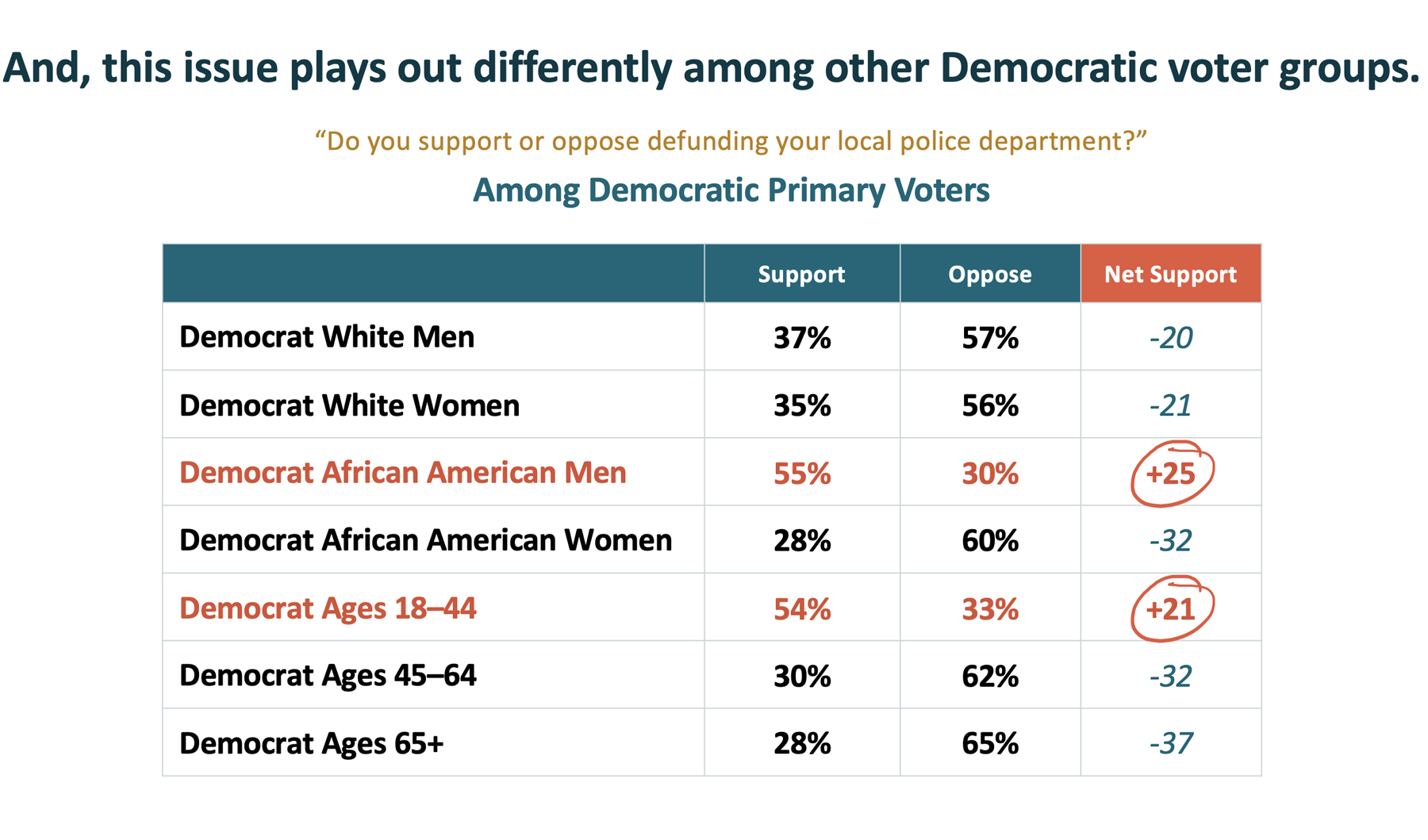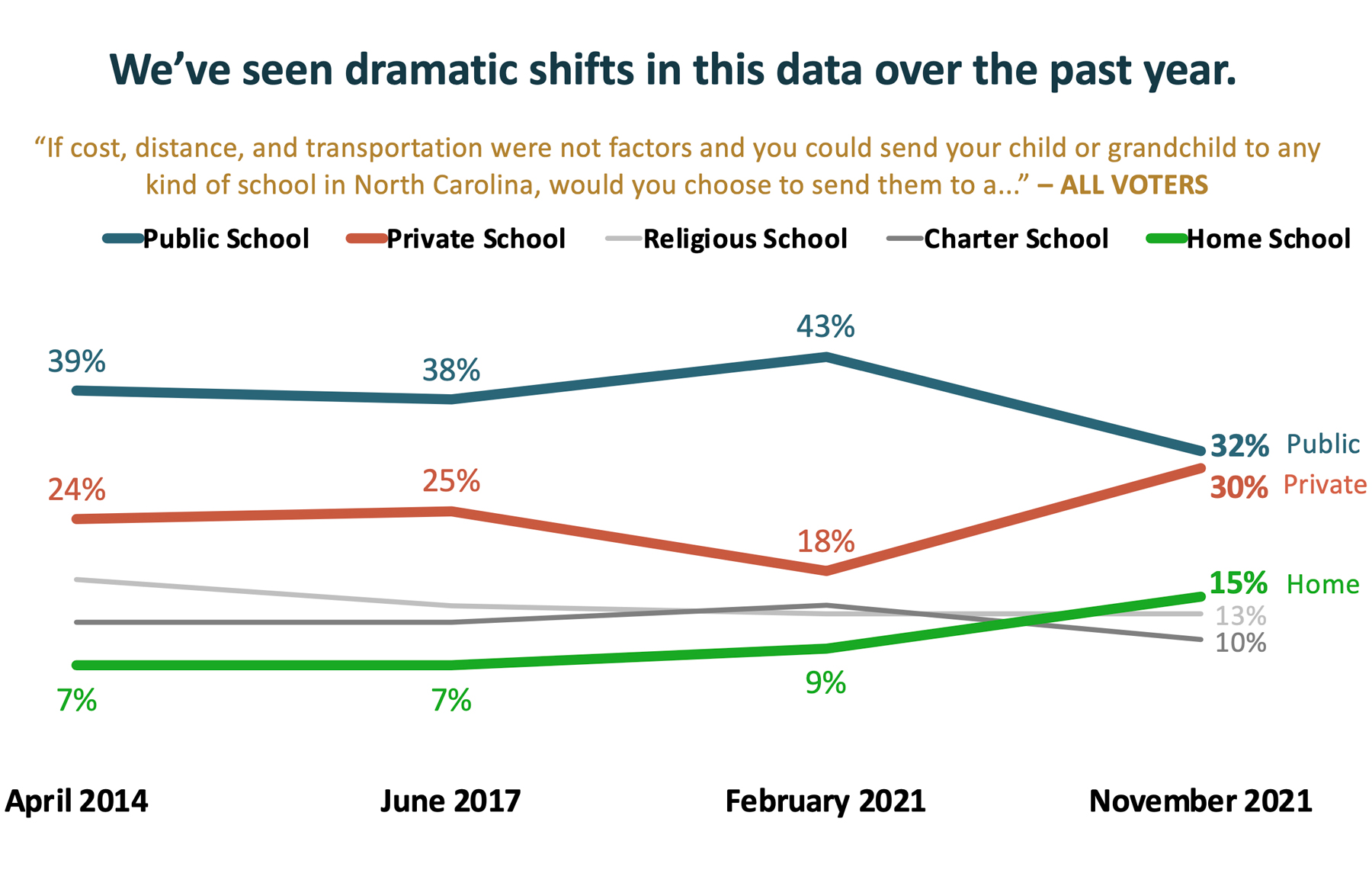by CLC Staff
Today we present the remainder of our findings from a poll conducted for us last month by Meeting Street Insights. In our first installment, we looked at the general political environment in North Carolina; in our second installment, we looked at the voters’ outlook on the overall issue agenda, specifically focusing in on the economy.
This post will look at the impact of COVID-19, public education in North Carolina, and various other hot-button issues including election security, Voter ID, the border wall, and defunding the police.
(Editor’s note: as has been noted earlier, our surveys utilized both a sample set of 500 registered voters (proportional to the state’s registration breakdown of Democrats, Republicans, and Unaffiliated voters — and then weighted for off-year turnout), and a sample set of 400 Democratic primary voters and 400 Republican primary voters.)
The Impact of COVID-19
Respondents were asked the following question: “If you had to pick only one, would you say the Coronavirus here in North Carolina has created more of a health crisis or an economic crisis?”
There is a clear divide between Democratic primary voters and Republican primary voters when it comes to their characterizations of COVID-19 — in fact, there is an almost complete inversion in perception between the two groups.
A strong majority of Democrats (58%) see COVID-19 as more of a health crisis than as an economic one (33%) and an even stronger majority of Republicans (65%) see it as more of an economic crisis than as a health crisis (29%). The larger group of all voters (which include Democrats, Republicans, and Unaffiliated voters) are more evenly split, with 50% seeing it as more of an economic crisis and 41% seeing it as more of a health crisis.

When it comes to the question of whether or not the federal government should require workers of companies with 100 or more employees be vaccinated from COVID-19, once again we see a significant difference between Republicans and Democrats. 78% of Democratic primary voters believe that the federal government should require workers of companies with 100 employees or more be vaccinated from COVID-19 while 68% of Republican primary do not believe that the federal government should require workers of companies with 100 employees or more be vaccinated from COVID-19.
Mirroring this partisan divide, by a 6 to 3 vote last week, the U.S. Supreme Court issued a stay of President Biden’s vaccine and testing requirement on business with 100 more employees (with the three liberal justices — Breyer, Kagan, and Sotomayor — dissenting) saying that the federal agency promulgating the mandate, OSHA, had exceeded its authority to regulate safety in the workplace. The mandate would have affected an estimated 84 million workers.
The larger group of all voters (which include Democrats, Republicans, and Unaffiliated voters) are more evenly split, with 48% saying that they agree with the vaccination requirement on business with 100 more employees and 45% disagreeing with it.
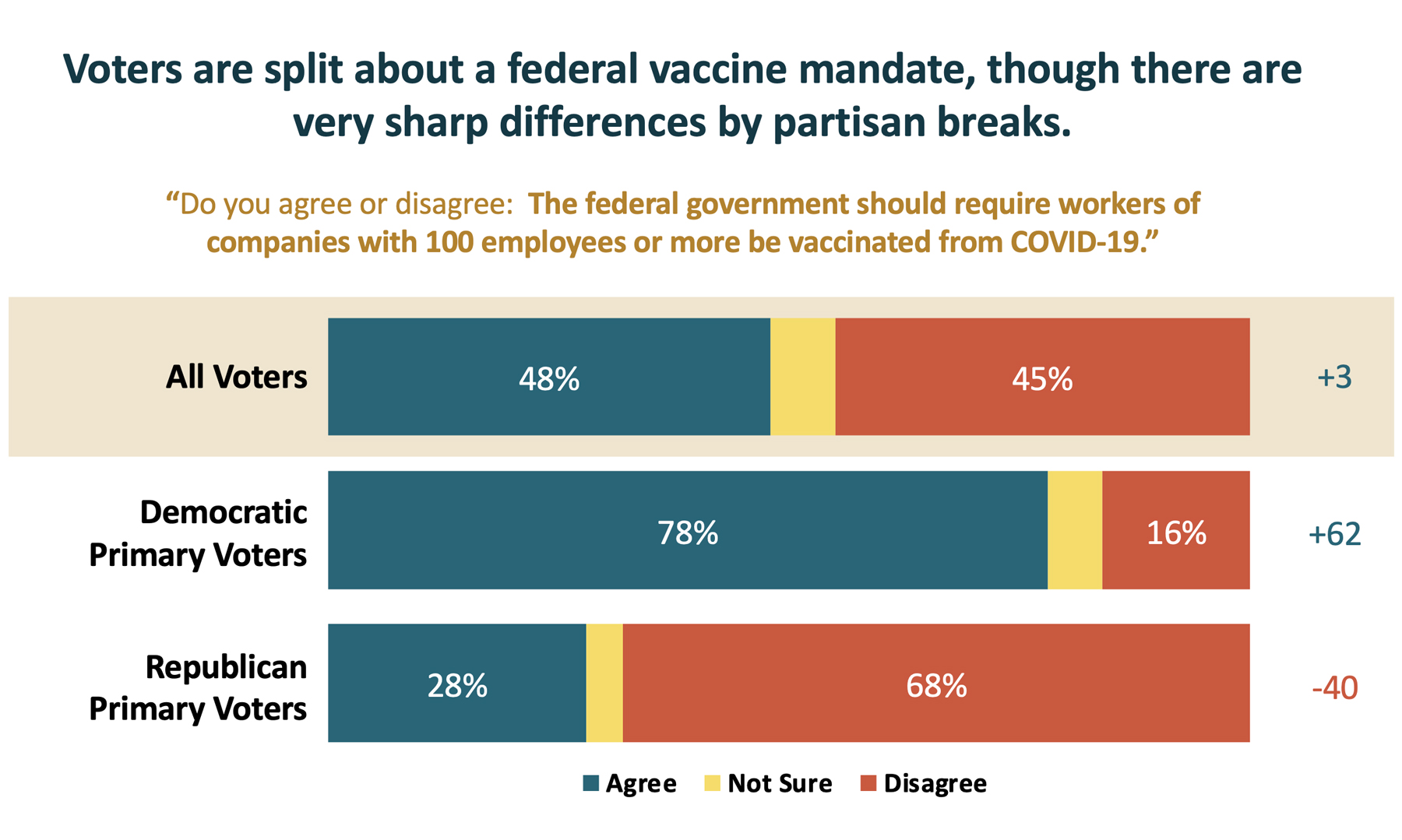
When respondents were asked if they agreed or disagreed with allowing employers to fire employees who choose to not get (or refuse) the COVID-19 vaccine, most of North Carolina’s voters (52%) disagreed while 39% agreed and 9% were unsure.
Once again, we see a stark difference here between the two parties: 62% of Democratic primary voters agree that employers should be allowed to fire employees who choose to not get the COVID-19 vaccine (with 30% disagreeing and 8% not sure) while 69% of Republican primary voters disagree that employers should be allowed to fire employees who choose to not get the COVID-19 vaccine (with 26% disagreeing and 5% not sure).
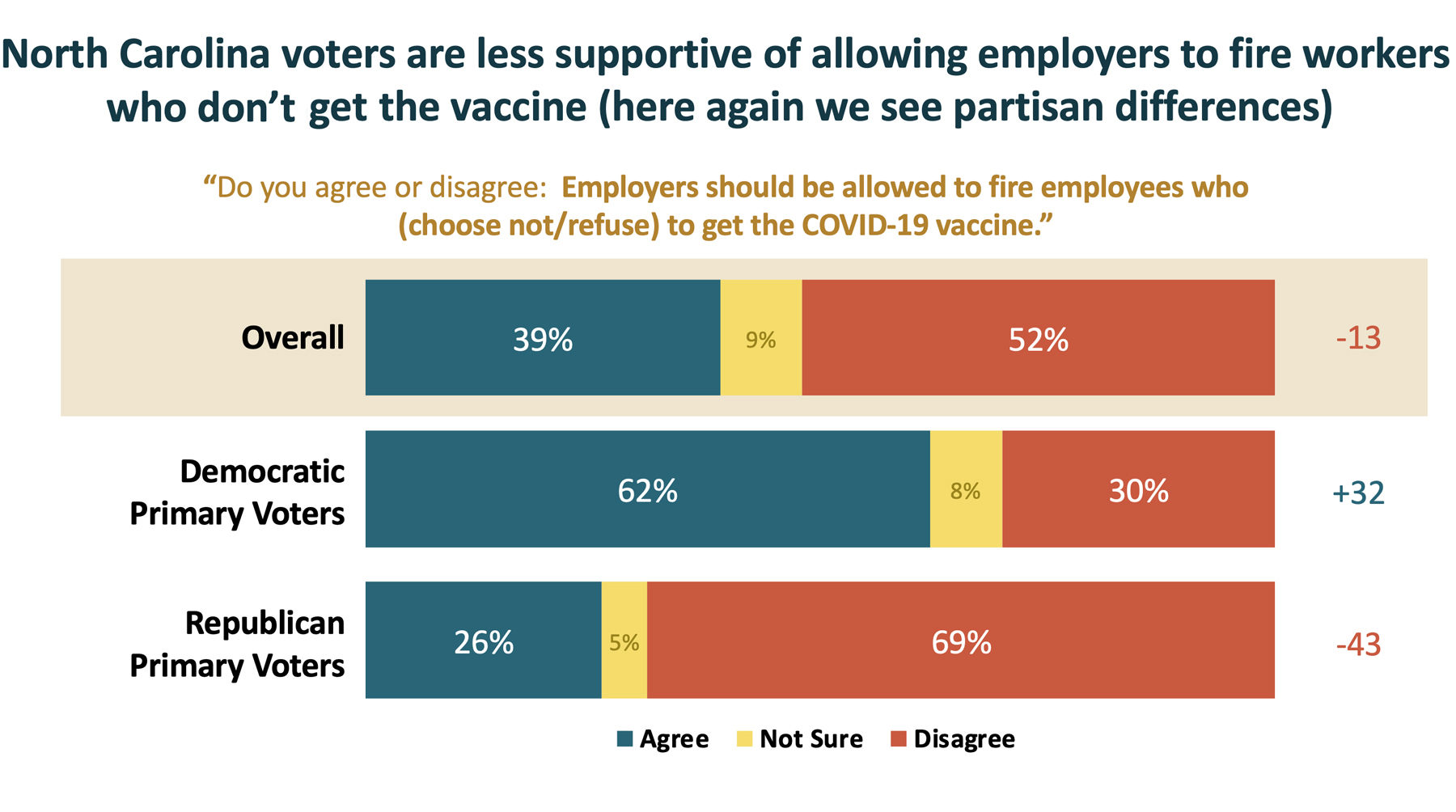
With the exception of “Trump Republicans,” most voters overwhelmingly support government mandates requiring children to wear masks in school; a whopping 69% of Trump Republicans oppose government mandates requiring children to wear masks in school. (As noted in our prior posts, among North Carolina’s Republican primary voters, 58% characterized themselves as more supportive of former president Donald Trump and his agenda as compared to 37% who indicated they were more supportive of candidates aligning themselves with a more traditional or “establishment” version of the Republican Party. Just 5% said they supported neither faction or were not sure.)
Among Democratic primary voters, 83% agree with government mandates requiring children to wear masks in school, while just 11% oppose them. Curiously, a larger percentage of “Biden Democrats” (92%) support school mask mandates than does the Sanders/Warren wing of Democratic primary voters (80%). (As noted in our prior posts, among North Carolina’s Democratic primary voters, 60% characterized themselves as ideologically more supportive of President Joe Biden and his agenda as compared to 28% who considered themselves more ideologically aligned with progressive Senators Bernie Sanders of Vermont and Elizabeth Warren of Massachusetts. 12% said they supported neither faction or were not sure.)
(Editor’s note: The most recent guidance from the Centers for Disease Control and Prevention (CDC) recommends universal indoor masking for all teachers, staff, students, and visitors to K-12 schools, regardless of vaccination status.)
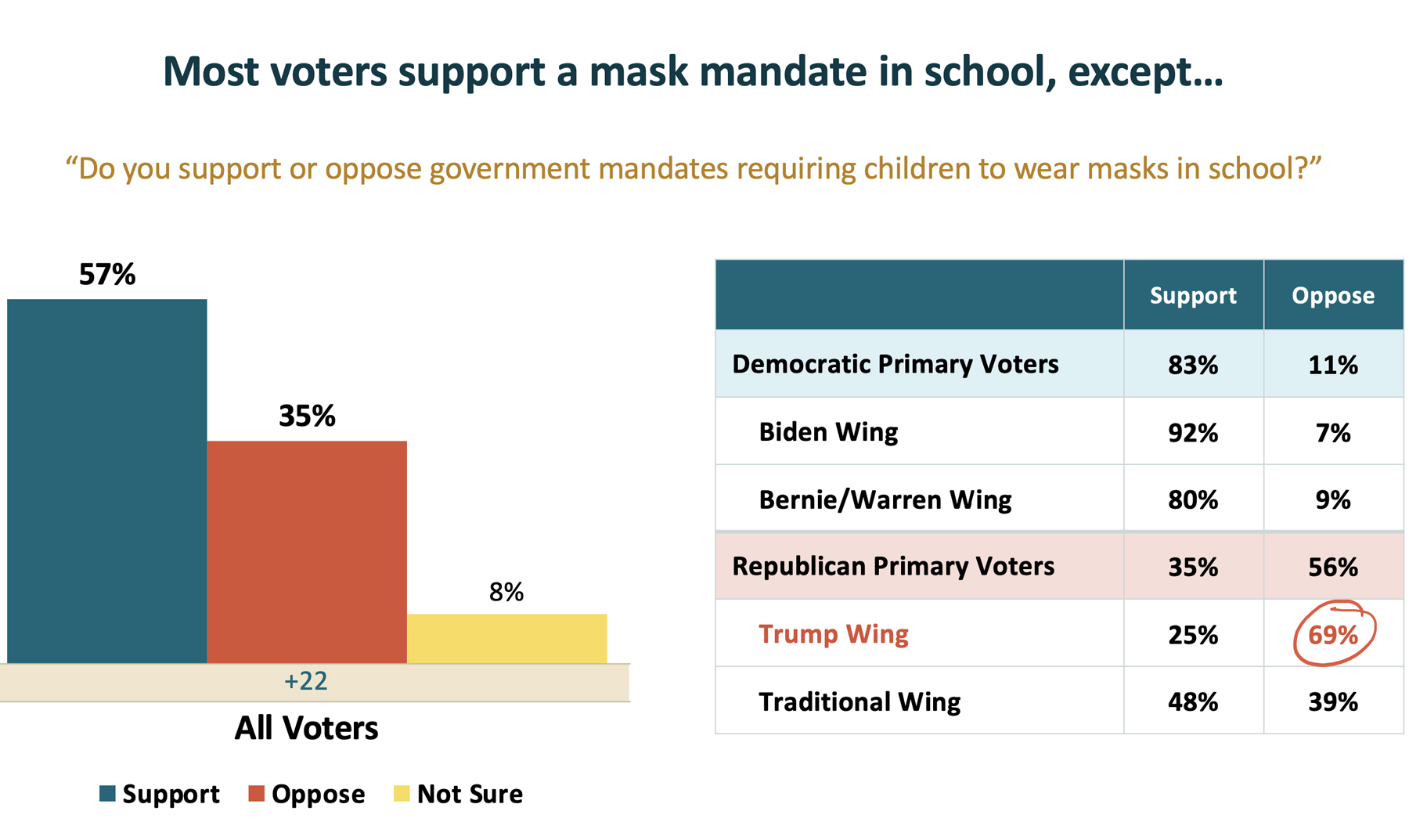
North Carolina voters are evenly divided on the question of vaccine mandates for school children, however. Among a sampling of all voters, 47% agreed that public schools should require children to get the COVID-19 vaccine before being allowed to attend in-person classes while 46% disagreed (7% were not sure).
Again, we see a striking difference between Republicans and Democrats on the issue. 75% of Democratic primary voters agree that public schools should require children to get the COVID-19 vaccine before being allowed to attend in-person classes (with just 18% disagreeing) and 65% of Republican primary voters disagree that public schools should require children to get the COVID-19 vaccine before being allowed to attend in-person classes (with 29% agreeing).
And, perhaps not unsurprisingly, the percentage of Trump Republicans who oppose requiring children to get the COVID-19 vaccine before being allowed to attend in-person classes is much higher (76%) than their counterparts in the traditional Republican wing (53%).
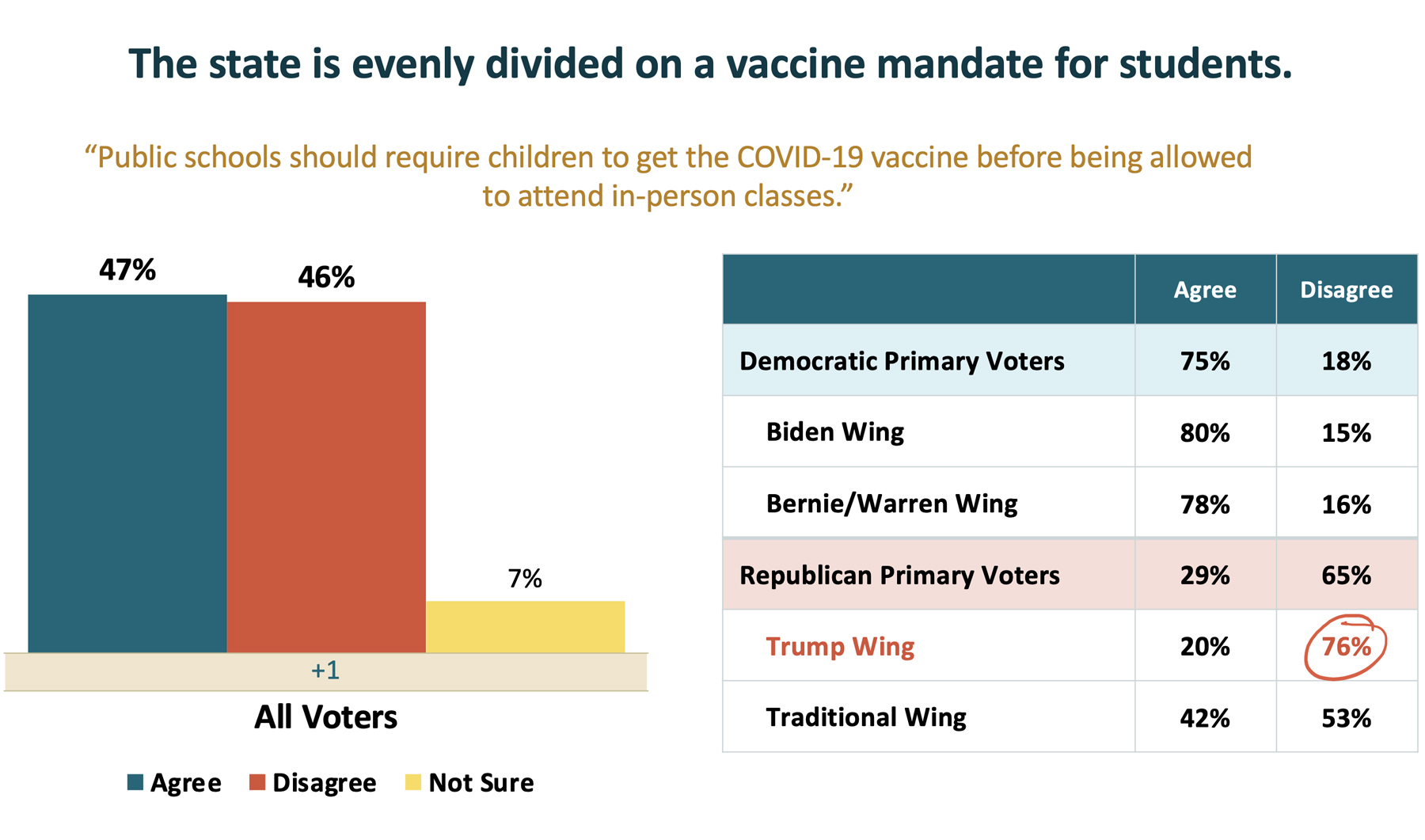
Public School Education
Respondents were asked the following question: “Generally speaking, over the last two years, would you say you have become more satisfied or less satisfied with the job North Carolina’s public schools are doing educating our children?”
For some context, North Carolina’s K-12 public schools were closed, by executive order from Governor Cooper, for in-person instruction from March 15 to the end of the 2019-2020 school year. Although schools were allowed to reopen at the start of the 2020-2021 school year, most schools began the term with virtual or hybrid learning. For the remainder of the 2020-2021 school year, North Carolina’s K-12 public education scored a 51 rating, according to Burbio’s K-12 School Opening Tracker. The data analysis firm ranked all 50 states from 0 to 100 on its Average In-Person Index by State, with 0 being 100% virtual learning and 100 being 100% in-person instruction (see the “2020/2021 School Year in Review” chart on the K-12 School Opening Tracker). More on Burbio’s methodology here. For the most part, schools returned for in-person learning in the current (2021-2022) school year.
In response to the question, nearly half of all North Carolina voters (49%) said they were less satisfied with the state’s public schools, including a plurality of Democratic primary voters (38%) and most Republicans (61%).
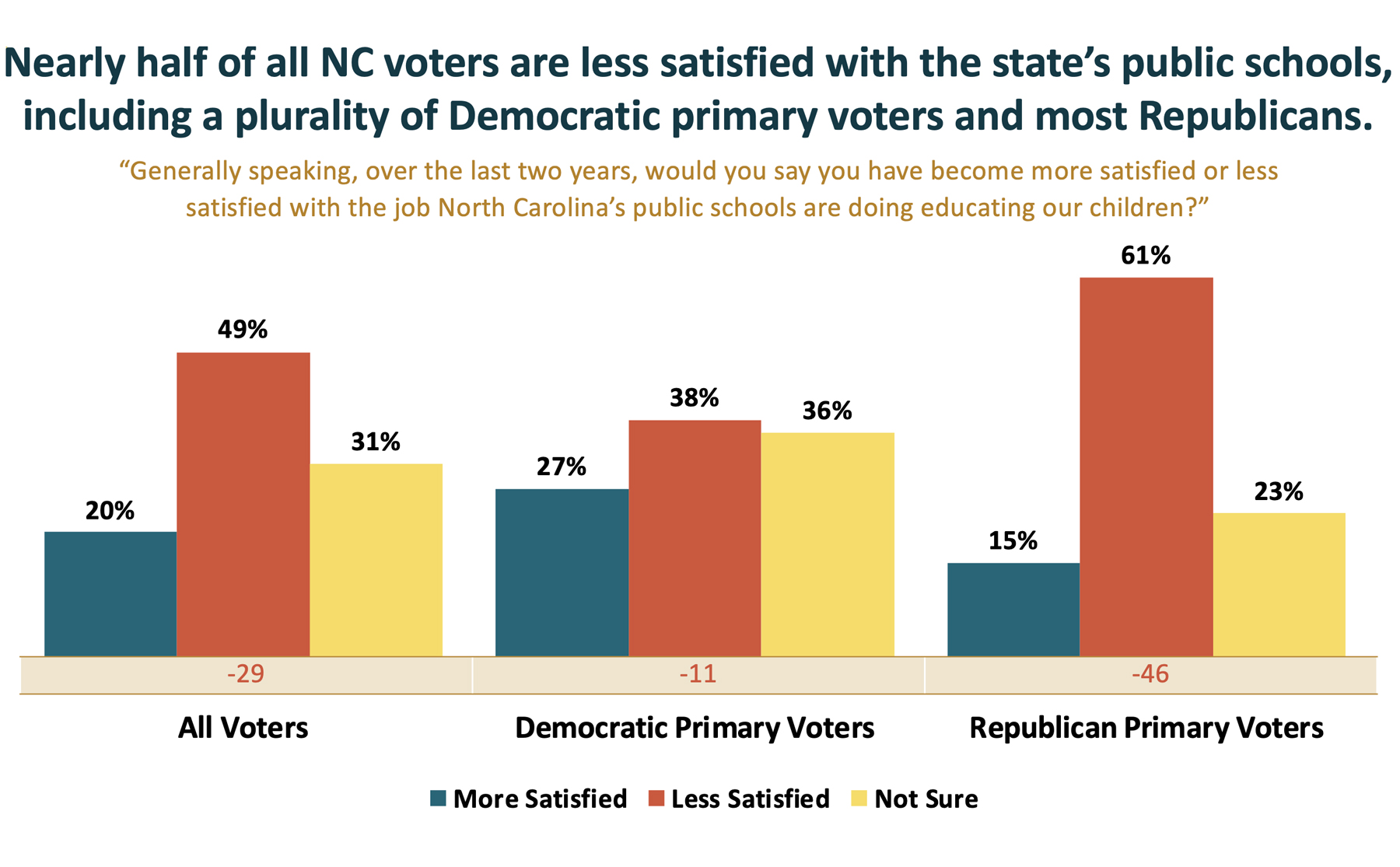
No major demographic subgroup was more satisfied with North Carolina’s public schools over the last two years. In fact, 57% of unaffiliated voters were less satisfied, while 55% of white women with college degrees were less satisfied, and 51% and 65% of the Raleigh media market and the Triad media market were less satisfied, respectively.
There has been a dramatic shift over the last year in support for the state’s public school system. When asked what kind of school they would send their child to if cost, distance, and transportation were not factors, 32% chose traditional public schools (down from 43% in February 2021), 30% chose private schools (up from 18% in February 2021), and 15% chose home schooling (up from 9% in February 2021).
In the 2020-2021 school year, North Carolina’s home school population grew by more than 30,000 students (a 20.6% increase from the 2019-2020 school year) and private schools increased by 3,282 children, a 3.3% increase.
When analyzed by party affiliation, a plurality (43%) of Democratic primary voters chose traditional public schools, 29% chose private schools, 12% chose home schooling, 5% chose private religious schools, and 11% chose public charter schools. A plurality of Republican primary voters (30%) chose private schools, 21% chose traditional public schools, 12% chose home schooling, 24% chose private religious schools, and 14% chose public charter schools.

Interestingly, among Democratic primary voters, just 38% had children enrolled in traditional public schools; among Republican primary voters, just 24% had children enrolled in traditional public schools. A majority of both groups (62% and 76% respectively) educated their children in settings other than traditional public schools.
North Carolina’s Opportunity Scholarship program remains extremely popular. Opportunity Scholarships (colloquially referred to as “vouchers”) are income-based grants for eligible children in kindergarten through the 12th grade. When asked if they support or oppose these grants, 62% said they support them (this includes 60% of Democratic primary voters and 65% of Republican primary voters) and 26% said they oppose them.
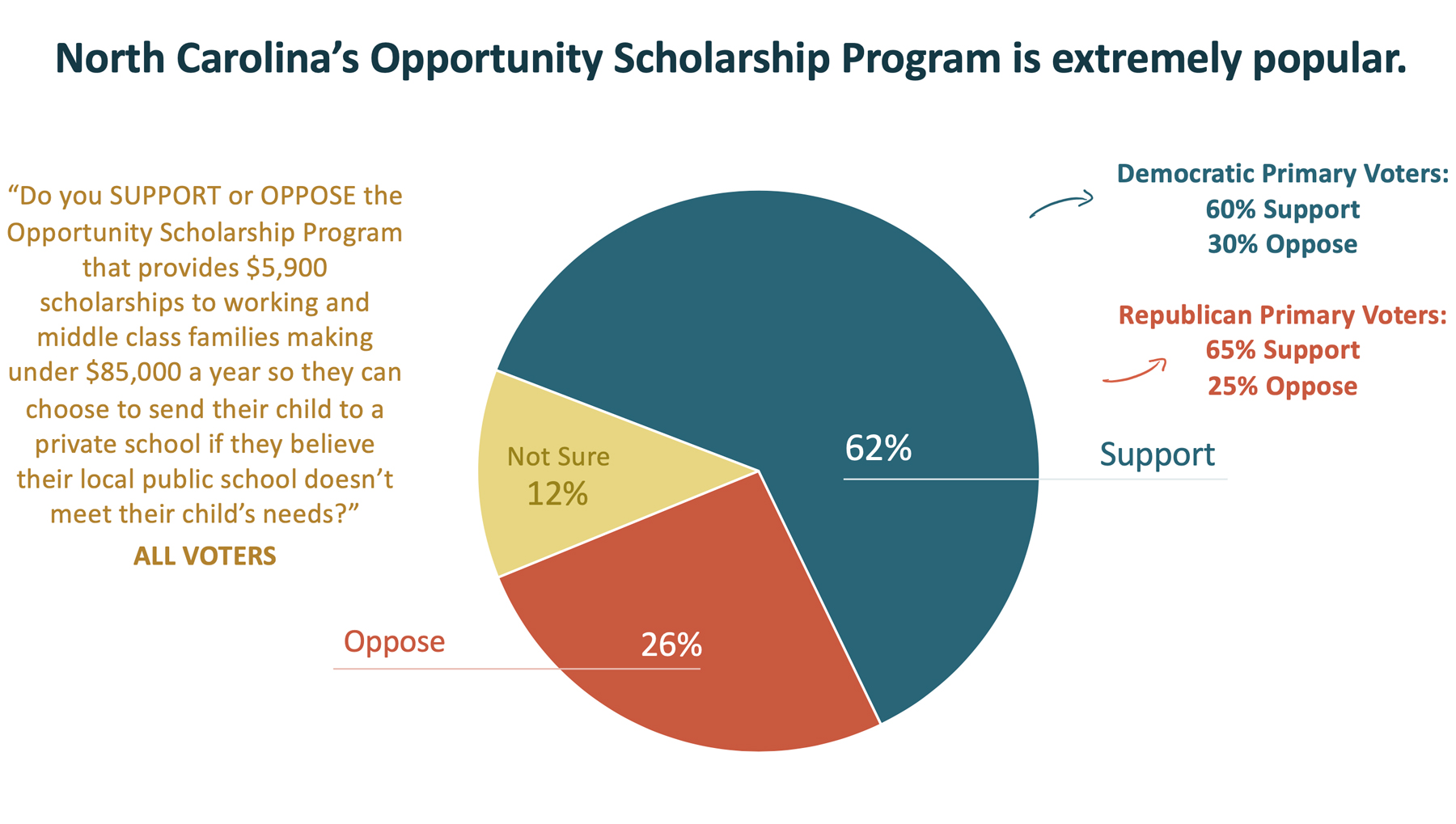
The popularity of the Opportunity Scholarship program in North Carolina has increased over the last six years — with a ten point jump since 2015. Even Governor Cooper, a Democrat who has consistently opposed Opportunity Scholarships in the past, seems to be coming around. For the first time in his five years as governor, Cooper has recognized School Choice Week in North Carolina.

Among those who know about it, Critical Race Theory (CRT) is a politically divisive issue. CRT is an academic and social movement that sees race as a social construct, focusing on it as the key to understanding society by linking race and racism to power. When asked if they approve or disapprove of public schools teaching about CRT, 42% of voters disapproved of it and 37% approved of it. 54% of Democratic primary voters approved of it and 72% of Republican primary voters disapproved of it.
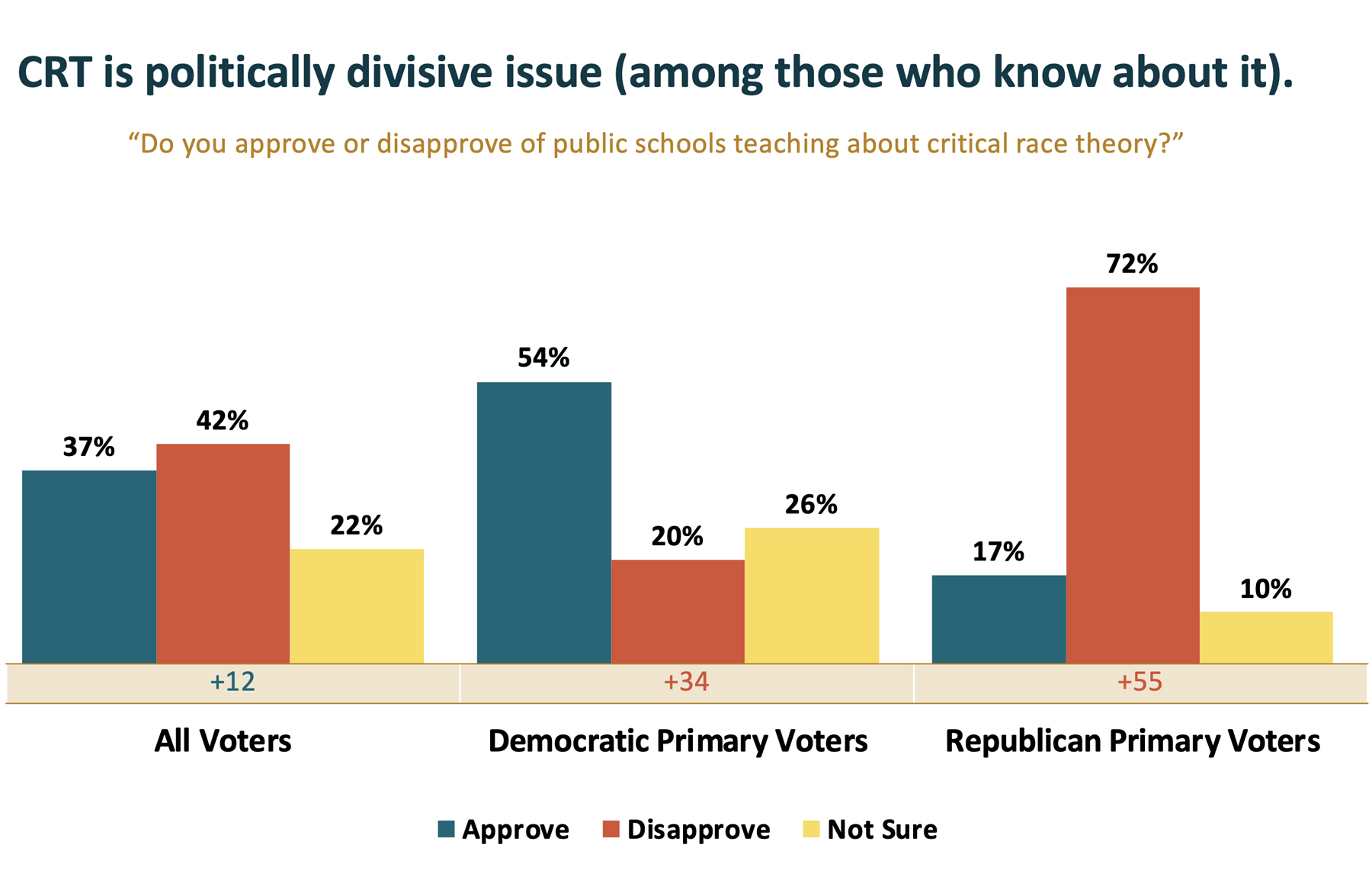
Other Hot-button Issues
While most of North Carolina’s voters are confident that this year’s mid-term elections will be conducted fairly, a majority of Trump voters (59%) are not. (Editor’s note: our poll was conducted prior to President Joe Biden’s remarks at a press conference on January 19, where he appeared to cast doubt on the 2022 election.)
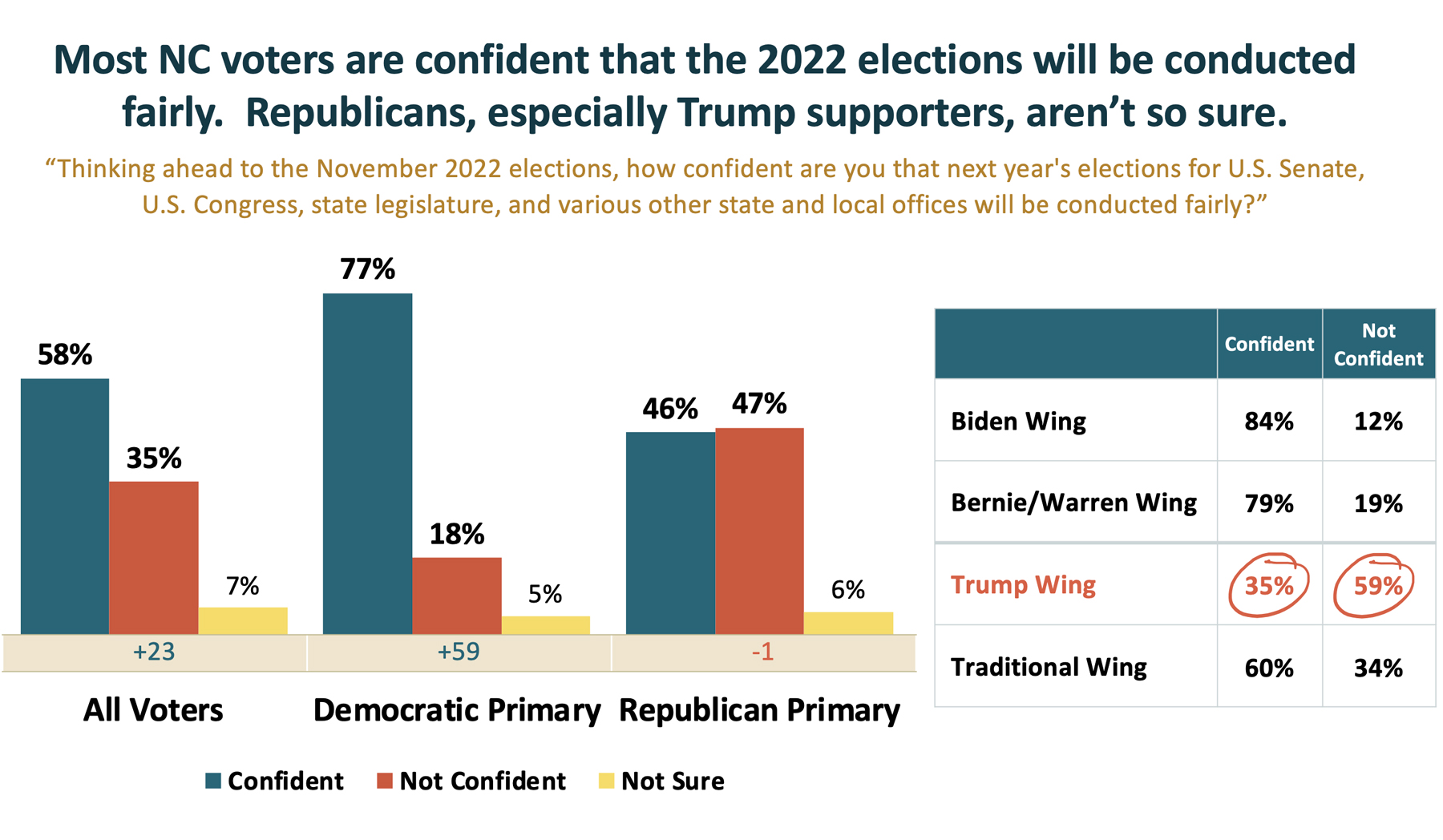
Support for Voter ID has risen substantially since February 2021, with 79% of all voters saying they support requiring a photo identification to vote.
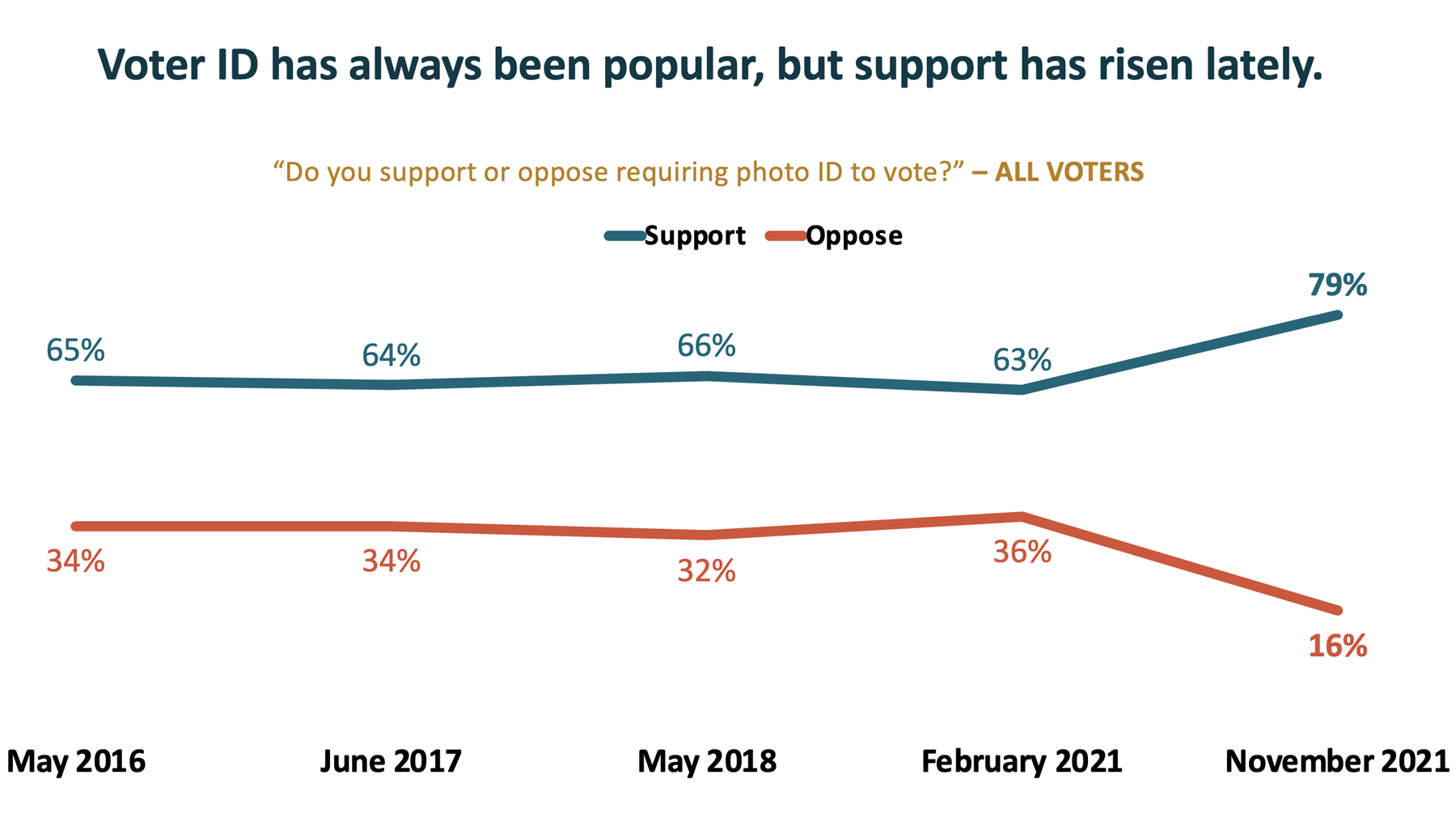
There has been a marked increase in support for Voter ID among Democratic primary voters, with a majority (59%) now supporting it compared with just over a third (34%) supporting it less than one year ago. Support for Voter ID among Republican primary voters is near-universal at 95%.
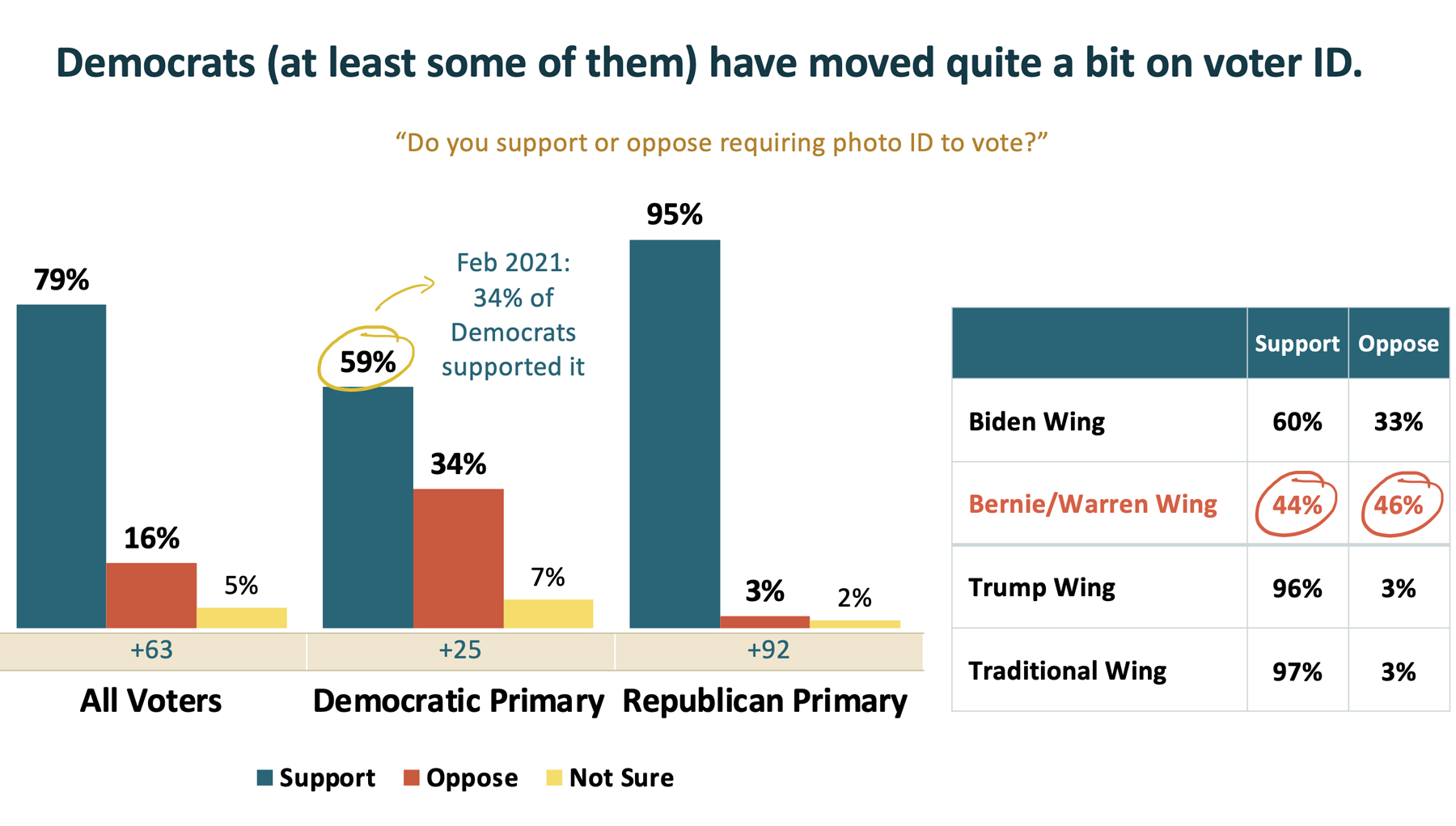
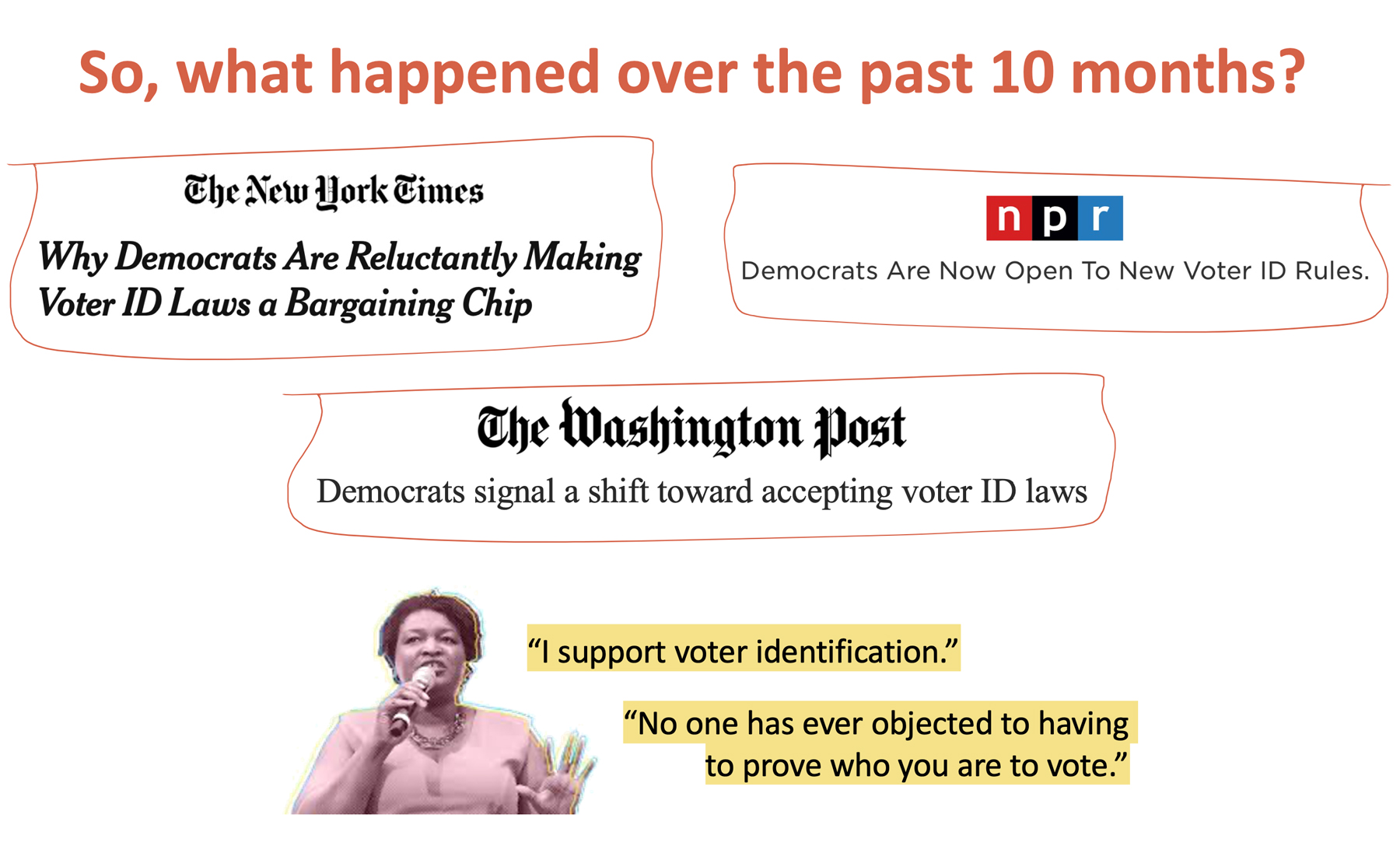
There has also been a substantial increase among Democratic primary voters in support for building a wall along the southern border. 30% now support building a wall, up from just 13% in May of 2018. While a majority of Democratic primary voters still oppose building a wall on the border with the United States and Mexico, the Sanders/Warren Democrats oppose it overwhelmingly at 82%. Support among Republican primary voters for building a wall is unsurprisingly strong (87%), and a substantial majority (60%) of all voters support it.
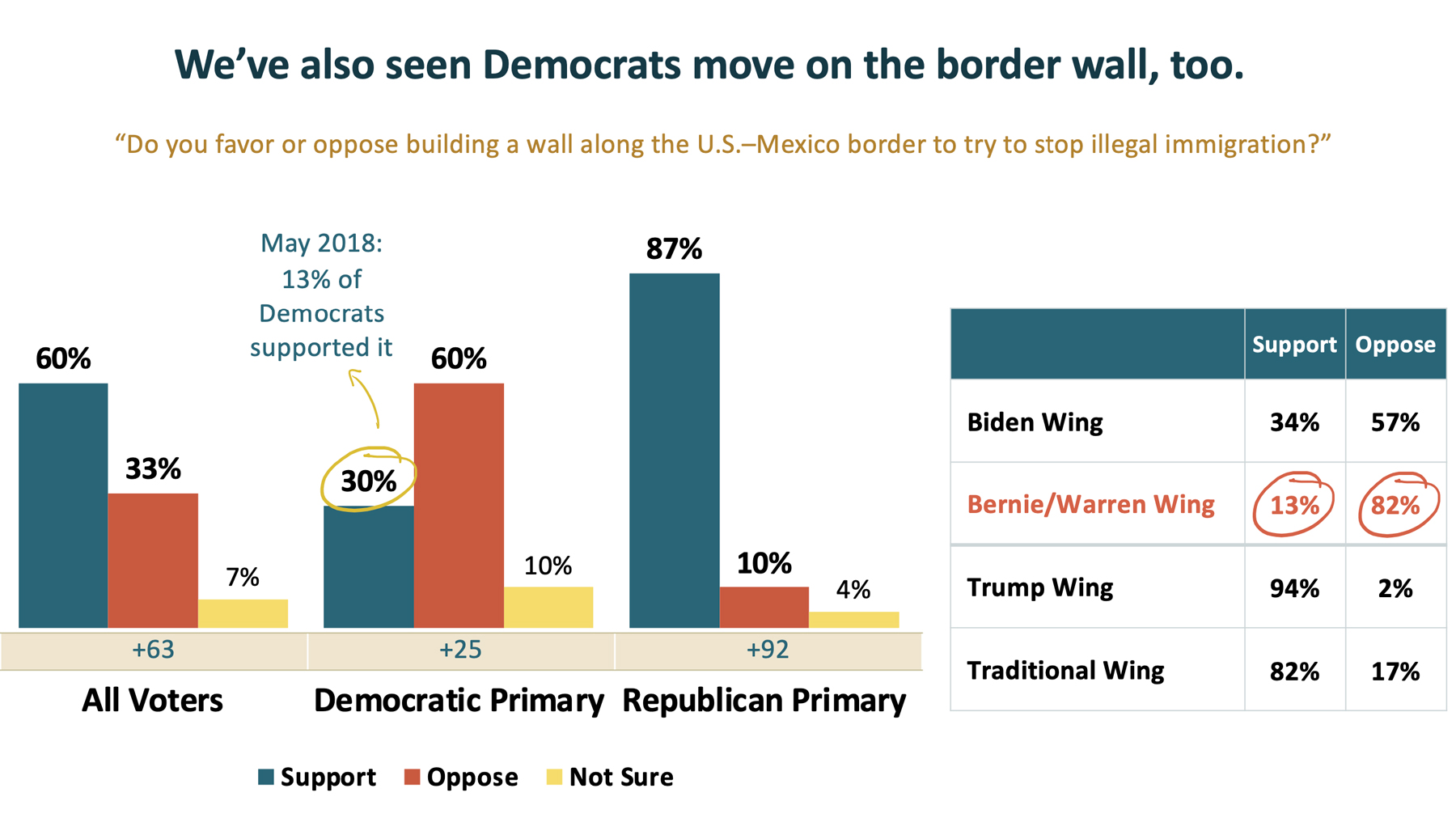
Defunding the police remains a deeply unpopular idea, except among the Sanders-Warren wing of the Democratic primary electorate. Strong majorities of all voters (63%), Democratic primary voters (55%), and Republican primary voters (78%) oppose initiatives that defund local police departments. Just 42% of self-identified Sanders-Warren Democrats oppose defunding the police, while 49% support it.
c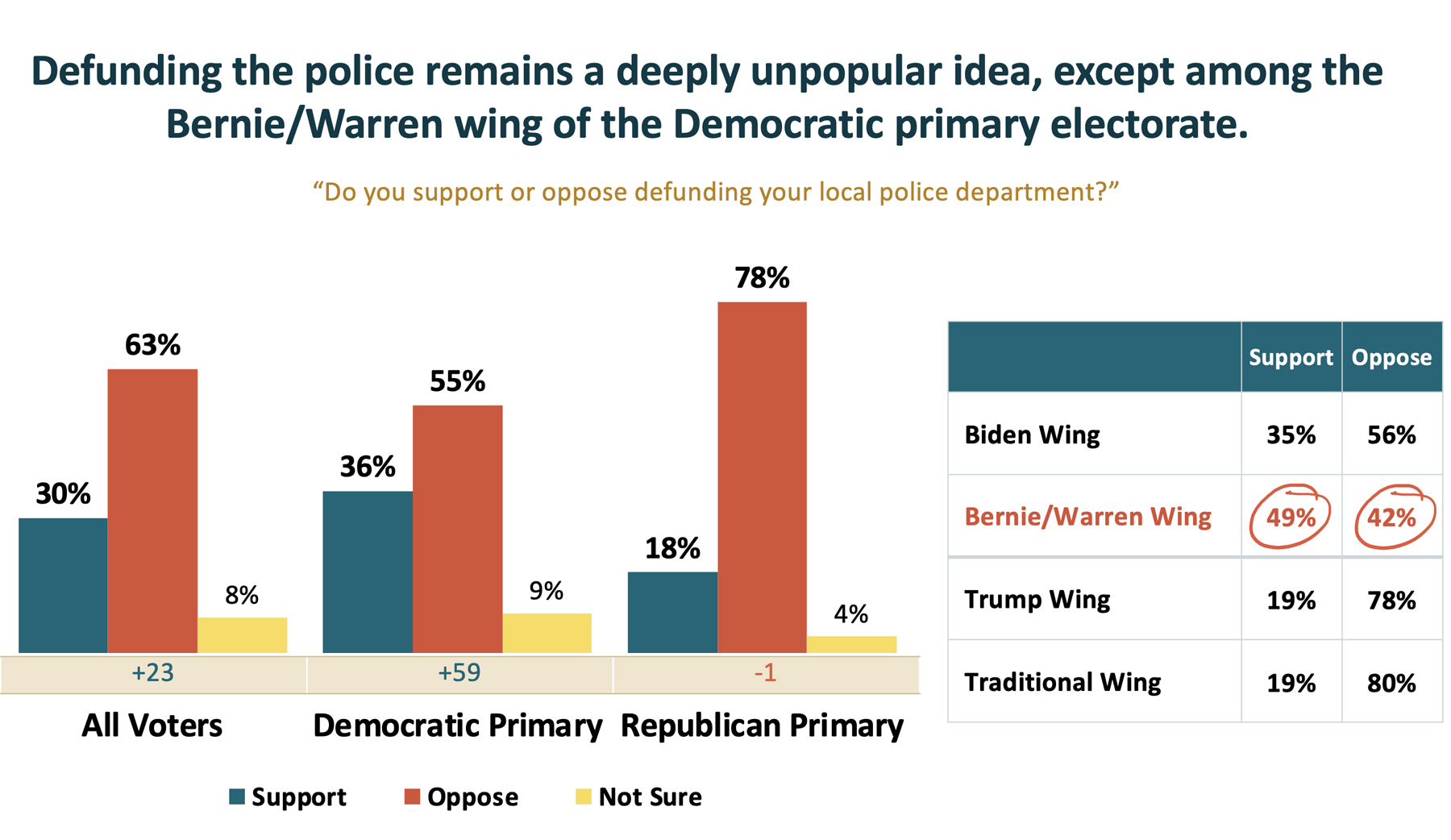
And while a majority of Democratic primary voters do oppose defunding the police, strong majorities of male African American Democrats and Democrats aged 18 to 44 support efforts to defund local police departments.
